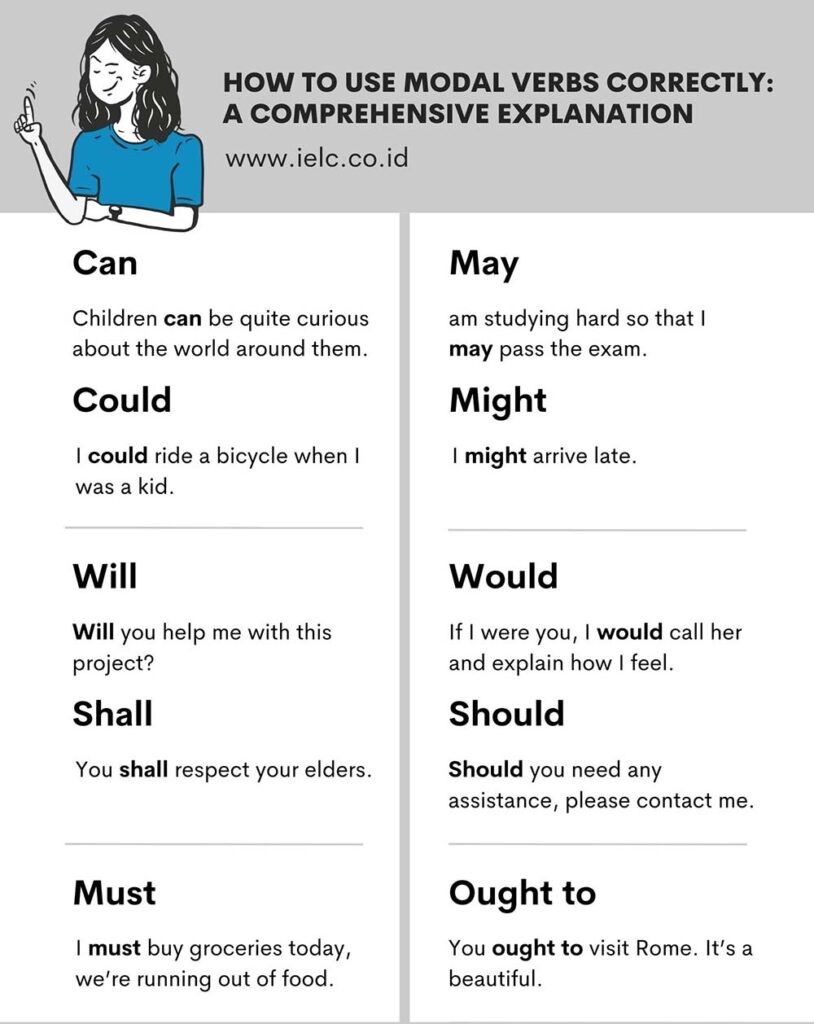
How to use modal verbs correctly: a comprehensive explanation
Welcome, learners!
Have you ever heard of modal verbs?
They might sound a bit technical, but we use them every single day!
Modal verbs are auxiliary (or helping) verbs that are used to express ability, possibility, permission, obligation, necessity, advice, and requests.
Unlike main verbs, they do not indicate an action but rather they are used to modify the mood of the main verb itself!
Wait, mood? Like happy, sad, or angry?
Actually, we are talking about different kind of mood! In English grammar, “mood” is used to refer to a verb category or form which indicates whether the verb expresses a fact (indicative mood), a command (imperative mood), a question (interrogative mood), a condition (conditional mood), or a wish or possibility (subjunctive mood).
For example, consider the sentence “You go to the store.” This is in the indicative mood, stating a fact or a strong command. Now, if we add a modal verb, the mood of the sentence changes:
- You should go to the store (Advice – expressing what is right or beneficial)
- You could go to the store (Possibility – expressing an option or choice)
- You must go to the store (Necessity – expressing an obligation or requirement)
So, when we say modal verbs “modify the mood” of a verb, we mean they change the verb’s intention or tone. They give us more information about the verb and the situation, adding layers of meaning to the sentence.
Don’t worry if you still feel a bit confused. Let’s take a closer look at each modal verbs, shall we?

1. Can
Can is used to express ability, ask permission, make recommendation, suggest possibility and expression generalization or typical behavior. It can also be used to express possibility in a conditional statement.
Example:
- I can dance (ability)
- Can I use your phone? (ask for permission)
- It can be a good idea (possibility)
- You can try adding some spices to enhance the flavor (recommendation)
- Cats can be an independent animal (generalization)
- Children can be quite curious about the world around them (typical behavior)
- If it stops raining, we can go for a walk (expressing possibility in a conditional sentence)
2. Could
Could is used to express past ability, suggestion, possibility, uncertainty and to express a polite request.
Example:
- I could ride a bicycle when I was a kid (past ability)
- You could visit the museum when you’re in town (suggestion)
- It could rain later, so you might want to bring an umbrella (possibility)
- Im not sure if I could attend the meeting tomorrow (uncertainty)
- Could you please close the door? (polite request)
Note: “could” is often used in more polite or tentative contexts compared to “can”. It can convey a sense of politeness or softening the impact of a statement.
3. May
May is used to express possibility, wishes, purpose, and ask for permission in a rather formal way.
Example:
- She may visit us next month (possibility)
- May all your dreams come true (wish)
- I am studying hard so that I may pass the exam (purpose)
- May I go to the bathroom please? (asking permission in a formal way)
Note: it’s worth noting that “may” is considered more formal and polite compared to “can” when asking for permission or making request. However, in everyday conversation, “can” is often used interchangeably with “can” in these contexts.
4. Might
Might is used to express possibility, uncertainty, polite request and make a tentative recommendation.
Example:
- I might arrive late (possibility)
- He might be at the party (uncertainty)
- Might I ask you a question? (polite request)
- You might want to read this (tentative recommendation)
Note: “Might” is often used in more formal and polite contexts, and it is also used to express a lower level of probability compared to “may”.
5. Must
Must is used to express strong obligation, necessity, certainty, strong possibility, as well as expressing prohibition (in the negative form).
Example:
- Everyone must follow the rules and regulations (obligation)
- I must buy groceries today, we’re running out of food (necessity)
- He must be the new employe, I saw him in the office yesterday (strong possibility)
- Employees must not disclose any confidential information (prohibition)
Note: “Must” expresses a stronger sense of obligation compared to other modal verbs like “should” or “ought to”.
6. Will
Will is used to express a strong belief or a prediction, make a polite request, state a future plan or arrangement, and offer a suggestion for improvement.
Example:
- You will love this movie. It’s so entertaining! (strong belief or prediction)
- Will you help me with this project? (polite request)
- We will have a meeting to discuss the project implementation next week (future plan)
- You will feel better if you get some rest (suggestion)
7. Would
Would is used to express a polite offer, offer a personal recommendation, give advice or suggestion and make a polite request. It is also used in reported speech.
Example:
- Would you like some tea? (polite offer)
- I would recommend trying the seafood pasta. It’s so delicious! (personal recommendation)
- If I were you, I would call her and explain how I feel (advice)
- Would you mind closing the window? (polite request)
Note: Both “will” and “would” can be used to offer suggestion or recommendations, but “would” is considered more polite and tentative. It’s important to consider the context and tone when using these modal verbs to convey your intended meaning!
8. Shall
Shall is used to express suggestions, offer assistance, intentions, future actions, obligations, and to state a requirement.
Example:
- Shall we go for a walk? (suggestion)
- Shall I call you a taxi? (offer assistance)
- I shall return your book by tomorrow (intention)
- She shall attend the conference next month (future actions)
- You shall respect your elders (obligation)
- All visitors shall registrate at the reception desk (requirement)
9. Should
Should is used to express advice, recommendation, obligation, expectations, assumptions, regrets, and expressing conditional statements.
Example:
- You should use sunscreen to protect your skin (advice)
- You should read this book, it’s very insightful! (recommendation)
- You should submit your report by tomorrow (obligation)
- They should be here by now (expectation)
- The lights are off, they should be asleep (assumption)
- I should have studied harder for the exam (regret)
- Should you need any assistance, please contact me (expressing conditional statements)
10. Ought to
Ought to is used to express moral obligation, expectation, desirability and strong recommendation.
Example:
- You ought to help those in need (moral obligation)
- She ought to be more careful with her personal belongings (expectation)
- You ought to visit Rome. It’s a beautiful city (desirability)
- You ought to see a doctor about that fever (strong recommendation.
Less commonly, ought to is used express probability or likelihood, for example:
- It ought to rain later today based on the forecast.
Note: when ought is used to express moral obligation or duty, it conveys a stronger sense of obligation compared to “should” or “could”.
That’s it! Now you’ve mastered all the modal verbs! To really cement your learning, let’s do some exercise below!
Choose the correct answer
1. Select the modal verb that expresses a strong advice or warning:
“You __ be careful when crossing the road.”
a) must
b) should
c) would
2. Select the correct modal verb to express a strong recommendation:
“You __ see that movie. It’s really good!”
a) must
b) should
c) would
3. Identify the modal verb that expresses a possibility but with less certainty:
“He __ be at the meeting, but I’m not sure.”
a) may
b) will
c) shall
4. Select the modal verb that expresses a hypothetical situation or unreal possibility:
“If I had more time, I __ travel the world.”
a) can
b) might
c) would
5. Choose the appropriate modal verb to express a strong obligation:
“You __ finish your homework before going out to play.”
a) must
b) might
c) would
6. Identify the modal verb that expresses a polite request:
“__ I borrow your pen for a moment?”
a) Can
b) Could
c) Shall
7. Select the modal verb that expresses a logical deduction or certainty:
“He’s been studying all night, so he __ be well-prepared for the exam.”
a) must
b) should
c) would
8. Choose the appropriate modal verb to express a future intention:
“I __ visit my grandparents next weekend.”
a) can
b) could
c) will
9. Choose the appropriate modal verb to express a suggestion or recommendation:
“__ we order pizza for dinner tonight?”
a) Will
b) Should
c) Would
10. Choose the modal verb that suggests a present ability:
“I __ speak three languages fluently.”
a) can
b) might
c) would
Answers:
- A. must
- B. should
- A. may
- C. would
- A. must
- B. could
- A. must
- C. will
- B. should
- A. can
At IELC, we teach English the right way
Our goal is to get you speaking in English with fluency and confidence as fast as possible. We want to give you the skills you need to fulfil your potential!
Our experienced teachers will guide you along every step of the learning process to ensure that you are not wasting your time, money, and energy on useless language exercises & wrong methods.
Our courses
With our modern campus and technology, we are equipped to provide the best possible courses for children, teens, and adults, including:
Online and on campus IELTS courses
Online and on campus TOEFL PBT courses
Online and on campus TOEFL iBT courses
We offer our classes in group classes or private classes.
No matter what your goals are, our team will help you achieve these goals by providing you with Indonesia’s best English courses!
Talk to our team today to get your FREE consultation and take your first step towards success.
Sincerely,

IELC Academic Director
